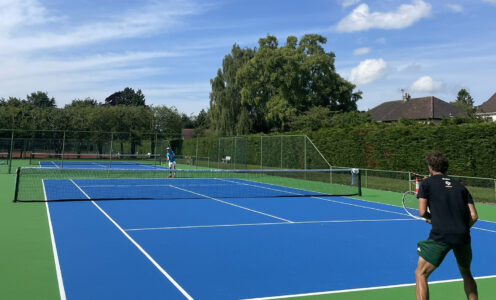Racket restringing
At Team Bath Tennis you will find a first rate stringing service run through the tennis team. We have a wide range of strings available for tennis. The stringing is done by one of our experienced stringers who will let you know when their work is done. The tennis team are more than happy to advise you over your choice of string and the tension you want the string to be in the racket. Please see our string availability and prices and a short introduction to choosing the correct string.
String availability
| Pros Pro Synthetic Gut | Tennis | £17.00 |
| Tecnifibre Synthetic Gut | Squash | £22.00 |
| Pros Pro Black Force Monofilament | Tennis | £22.00 |
| Babolat N.VY Multifilament | Tennis | £22.00 |
| Babolat Excel Multifilament | Tennis | £25.00 |
| Babolat Pro Hurricane Monofilament | Tennis | £25.00 |
| Babolat RPM Blast | Tennis | £28.00 |
| Luxilon Big Banger | Tennis | £28.00 |
| Labour Only | ALL | £14.00 |
| Sundries | ||
| Grips | Tennis | £6.00 |
| Overgrips | Tennis | £3.00 |
Procedure
1. Bring in your racket to the tennis office
2. Decide upon your string and tension through the advice from our stringers and fill out your booking form
3. Leave the racket in our hands to string!
4. Wait to receive a call from the stringing team to let you know the racket is completed.
5. Bring your booking form with you to the STV reception to pay for your racket. They will give you a receipt.
6. Bring your receipt back up to the tennis office between (9.00 to 17.00) to receive your racket.
7. Get back on to the tennis court with your newly restrung racket!
Which strings for me?
Strings are very much personal preference, but as a loose rule of thumb a loose string (50-56lbs) gives a little more height and power to your shots whereas a tight string (56+lbs) would give a lower, more controlled shot.
Basically, there are two types of strings – those made from natural gut, and those made from any other material. Those made from anything other than natural gut are generically termed synthetic strings.
Natural gut
Natural gut strings are made from beef or sheep intestines. The intestines are spun out to microscopic thicknesses, and then a number of individual strands are wound together to form a single string. A single tennis string will contain between 1,200 and 2,000 strands depending on its overall thickness.
Synthetic strings
Synthetic strings are made from a variety of materials. At one end are monofilament, (one solid piece), strings, and at the other end are multifilament, (many individual pieces joined together), strings, which mimic the construction of natural gut. In between are all manner of strings, some made with exotic materials like aluminium and titanium, some monofilaments with one or more spiral wraps to add power or feel, and some with rough surfaces which, the manufacturers claim, help add spin to your shots.
Multifilaments are the nearest thing in construction to natural gut, so it’s no surprise that they play the closest to gut in terms of performance. They are great for absorbing shock, so anyone with tennis elbow or other arm problems should give them serious consideration, and offer great touch and control. If you’re
after the best possible touch and control, or if comfort is of prime consideration, multifilament strings could well be for you.
Monofilaments are the exact opposite to multifilaments, in more ways than one. They are composed of a single strand, which may be of one type of material, or a composite of two or more. They are tougher than multifilaments, but do not provide as much touch.
In fact, monofilaments are all about one thing – power! There are also monofilaments on the market which contain titanium, tungsten, or copper, all of which claim to add more pace to your shots. Lastly, monofilaments are very poor at absorbing shock, and tend to send any vibrations straight up the arm. Those with arm problems should look elsewhere.
Hybrid
Hybrid is where you have two different string types for the main and the cross strings and is good for performance juniors as they start to break strings. The enhanced durability gives longer between string breakages, but the softer crosses reduce the amount of shock and helps protect young muscles!
If any arm problems start to develop, the use of monofilament strings should be stopped until the problem is sorted out.
Please phone 01225 384247 or email tennis@teambath.com for more information
Terms and conditions
Please note, although frames are inspected for damage when they are handed in, we cannot guarantee the condition of the frame prior to stringing. Should frame damage occur as a result of normal stringing procedure, we cannot be held responsible.
Rackets must be collected within 28 days of the restring, failure to do so may result in the racket being hired out to customers.
Although we try our best to have a 3-5 day turn around on the rackets, at busier times it may be slower and as such cannot be guaranteed to be complete within 5 days.






